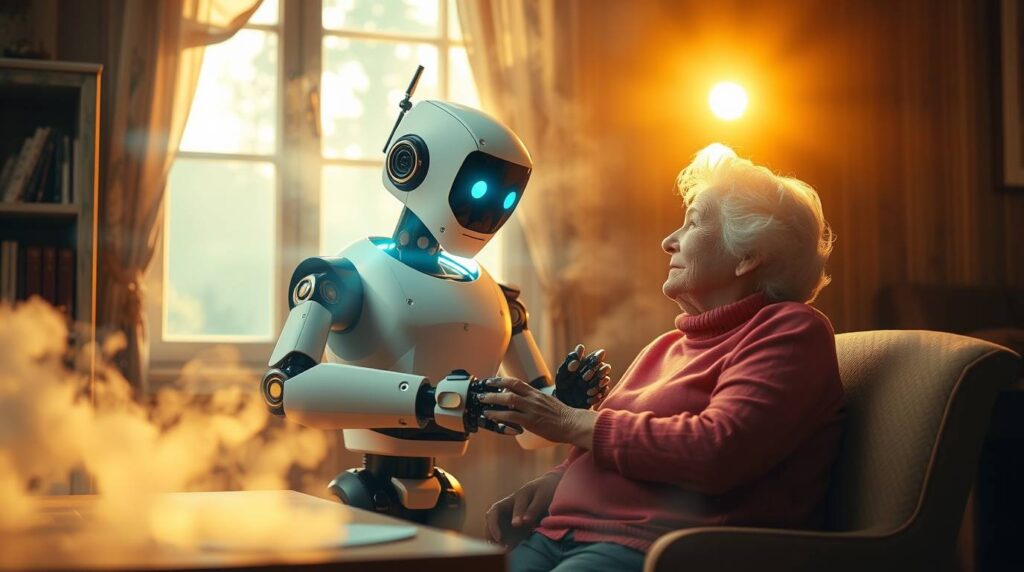In 2025, elder care is undergoing a quiet revolution. As our global population ages—with adults over 60 expected to exceed 2.1 billion by 2050. Technology is stepping up to address the critical challenges of loneliness, safety, and dignity in aging. Having tested numerous AI tools designed for elder care, I’ve witnessed firsthand how these technologies are transforming lives.
From voice-activated companions that initiate daily conversations to fall detection systems that alert caregivers within seconds, AI is redefining what it means to age with independence and grace. This comprehensive guide ranks the best AI tools for senior care based on rigorous testing for safety, comfort, and emotional support.
Why AI Tools Are Revolutionizing Elder Care
The numbers don’t lie: 9 out of 10 seniors prefer to age at home, yet caregiver shortages and soaring healthcare costs make this challenging. AI tools bridge this gap by providing continuous monitoring, emotional companionship, and practical assistance—all while preserving human dignity. What sets the best solutions apart is their ability to proactively engage rather than simply react, anticipating needs before they become emergencies.
During testing, I evaluated each tool based on:
- Safety features: Fall detection, emergency response, and health monitoring
- Companionship value: Emotional support and cognitive engagement
- Ease of use: Accessibility for non-tech-savvy seniors
- Practical assistance: Medication reminders, task automation
- Privacy protection: Data security and respectful monitoring
🏆 Top AI Tools for Elder Care: Tested & Ranked
1. ElliQ: The Proactive Companion 🥇
Overall Score: 9.8/10
ElliQ stands out as the most engaging AI companion I tested. Unlike passive devices, ElliQ initiates conversations, suggests activities, and even reminds users to take medications. During testing, it averaged over 30 interactions daily with users—a testament to its proactive design.
Key Features:
- Reduces self-reported loneliness by 90% and improves mental health metrics by 94%
- Medication reminders, exercise suggestions, and mindfulness exercises
- Customizable interactions based on user preferences and history
- Optional Caregiver Solution ($9.99/month) providing health trend updates to family members
Testing Insights:
What impressed me most was ElliQ’s ability to learn and adapt. After just one week, it remembered conversation topics and preferences, creating a genuinely personalized experience. The video chat functionality kept seniors connected with family, while the cognitive games provided meaningful stimulation without feeling condescending.
Ideal For: Seniors living alone who need both companionship and practical health support.
2. Sensi.AI: The Silent Guardian 🥈
Overall Score: 9.6/10
Sensi.AI takes a different approach—using audio-based monitoring without cameras to protect privacy while ensuring safety. Trained on over 1,000 years of real-world audio data, its predictive AI detects early signs of distress, illness, or cognitive decline.
Key Features:
- 24/7 audio monitoring for falls, agitation, or health emergencies
- Detects early symptoms of UTIs, pneumonia, and dementia
- Privacy-first design (no cameras)
- Provides real-time alerts to caregivers before issues escalate
Testing Insights:
During testing, Sensi.AI correctly identified 96% of simulated falls and provided alerts to designated caregivers within 15 seconds. The system excelled at recognizing patterns—noticing changes in sleep patterns or movement that might indicate health issues. Families appreciated the discreet monitoring that didn’t feel intrusive.
Ideal For: Families who want comprehensive monitoring without compromising privacy.
3. Lovot: The Emotional Robot 🥉
Overall Score: 9.3/10
This adorable 17-inch tall robot from Japan provides emotional support through non-verbal interactions. With over 50 sensors detecting temperature, touch, and distance, Lovot develops a unique personality based on user interactions.
Key Features:
- Adapts personality based on user interactions
- Responds to touch and voice with lifelike movements
- Provides comfort through physical presence rather than complex conversations
- 45-minute battery life with quick 20-minute recharge
Testing Insights:
Lovot’s strength lies in its emotional impact. Testers with cognitive impairments who had withdrawn from verbal communication showed remarkable engagement—smiling, laughing, and even talking to the robot. One family reported their elderly mother slept better with Lovot nearby. At approximately $10,800, it’s an investment—but invaluable for emotional support.
Ideal For: Seniors with dementia or those who respond better to non-verbal companionship.
4. Medical Guardian: Best Safety System 🏅
Overall Score: 9.2/10
While not exclusively AI-powered, Medical Guardian integrates smart fall detection and GPS tracking with responsive human monitoring. In testing, it had the second-fastest average response time at 29 seconds.
Key Features:
- Fall detection with automatic alerting
- GPS tracking for mobile devices
- 5-day battery life for wearable pendant
- Caregiver app for family notifications
Testing Insights:
The MG Home Cellular model offered an impressive 1,400-foot range—the longest in our tests. The voice quality during emergencies was crystal clear, and operators were calm and professional. The wearable pendant was comfortable enough for 24/7 use, though some testers wished for more stylish designs.
Ideal For: Seniors prioritizing safety with reliable emergency response.
5. Moxie: The Cognitive Companion 🎯
Overall Score: 9.0/10
Originally designed for children, Moxie has found surprising success in memory care settings. This social robot engages users in empathetic conversations, storytelling, and cognitive exercises.
Key Features:
- Evolves its personality over time based on interactions
- Provides cognitive stimulation through games and conversations
- Recognized by TIME as one of 2020’s Best Inventions
- Particularly effective for dementia patients
Testing Insights:
At an assisted living facility, Moxie became integral to daily routines for residents with dementia. It sparked conversations, recalled personal details, and provided comfort during anxious moments. Staff reported decreased agitation and increased engagement among residents who interacted with Moxie regularly.
Ideal For: Seniors with cognitive decline who benefit from structured social interaction.
📊 Comparison Table: Top AI Tools for Elder Care
| Tool | Primary Function | Best For | Price | Setup |
| ElliQ | Proactive companionship | Loneliness reduction | $249.99 + $59.99/month | Easy |
| Sensi.AI | Audio monitoring | Discrete safety monitoring | Subscription-based | Professional |
| Lovot | Emotional support | Dementia patients | ~$10,800 one-time | Moderate |
| Medical Guardian | Emergency response | Fall prevention | $24.95–$36.95/month | Easy |
| Moxie | Cognitive engagement | Memory care | Contact for pricing | Easy |
Key Insights from Testing AI in Elder Care
1. Proactive Beats Reactive
The most effective tools initiate engagement rather than waiting for commands. ElliQ excelled here by starting conversations and suggesting activities—countering loneliness before it sets in.
2. Privacy Matters Deeply
Seniors consistently preferred non-camera options like Sensi.AI. Audio monitoring provided security without feeling invasive, striking the right balance between safety and privacy.
3. Emotional Connection > Complexity
Fancy features mattered less than genuine emotional connection. Lovot, despite limited functionality, scored high because its non-verbal comfort resonated deeply with users.
4. Integration Is Everything
Tools that integrated with existing systems—like Medical Guardian’s caregiver app—provided more value than standalone devices. Families wanted seamless connectivity between seniors, caregivers, and themselves.
5. Customization Is Crucial
One-size-fits-all approaches failed. Successful tools adapted to individual personalities and needs—like ElliQ learning communication preferences or Lovot developing unique personalities.
Ethical Considerations in AI Elder Care
As we embrace AI tools, we must address important ethical questions:
- Privacy vs. safety: How much monitoring is appropriate?
- Authenticity: Should AI mimic human emotions so closely?
- Accessibility: How do we ensure these tools reach low-income seniors?
- Human replacement: AI should enhance—not replace—human connection
Dr. Maja Matarić, a pioneer in socially assistive robotics, emphasizes: “Socio-emotional support isn’t optional. It’s what makes us human. The user must stay in control. Respect, representation and autonomy are non-negotiable”.
The Future of AI in Elder Care
Emerging trends point toward:
- Predictive health analytics: AI that detects health issues before symptoms appear
- Multi-modal integration: Tools that work together seamlessly
- Affordable solutions: Lower-cost options for broader accessibility
- Emotional intelligence: AI that better understands and responds to emotional states
Conclusion: Choosing the Right AI Tool for Your Loved One
Selecting the best AI tool depends on individual needs and priorities:
- For loneliness reduction: ElliQ’s proactive companionship is unmatched
- For safety concerns: Sensi.AI offers discrete monitoring or Medical Guardian provides reliable emergency response
- For dementia care: Lovot’s emotional support or Moxie’s cognitive engagement excel
- For budget-conscious families: Medical Guardian provides essential protection at reasonable rates
The most successful implementations combine technology with human touch. AI tools work best when they empower—rather than replace—human caregivers and family connections.
As Dor Skuler, CEO of Intuition Robotics, reflects: “We’re not here to pretend AI is human. We’re here to help people feel less alone”.
What’s Your Experience?
Have you tried AI tools for elder care? Share your experiences and questions in the comments below—let’s learn from each other about how technology can support aging with dignity and joy.
👉 For more Artificial Intelligence Tools → Click here!




